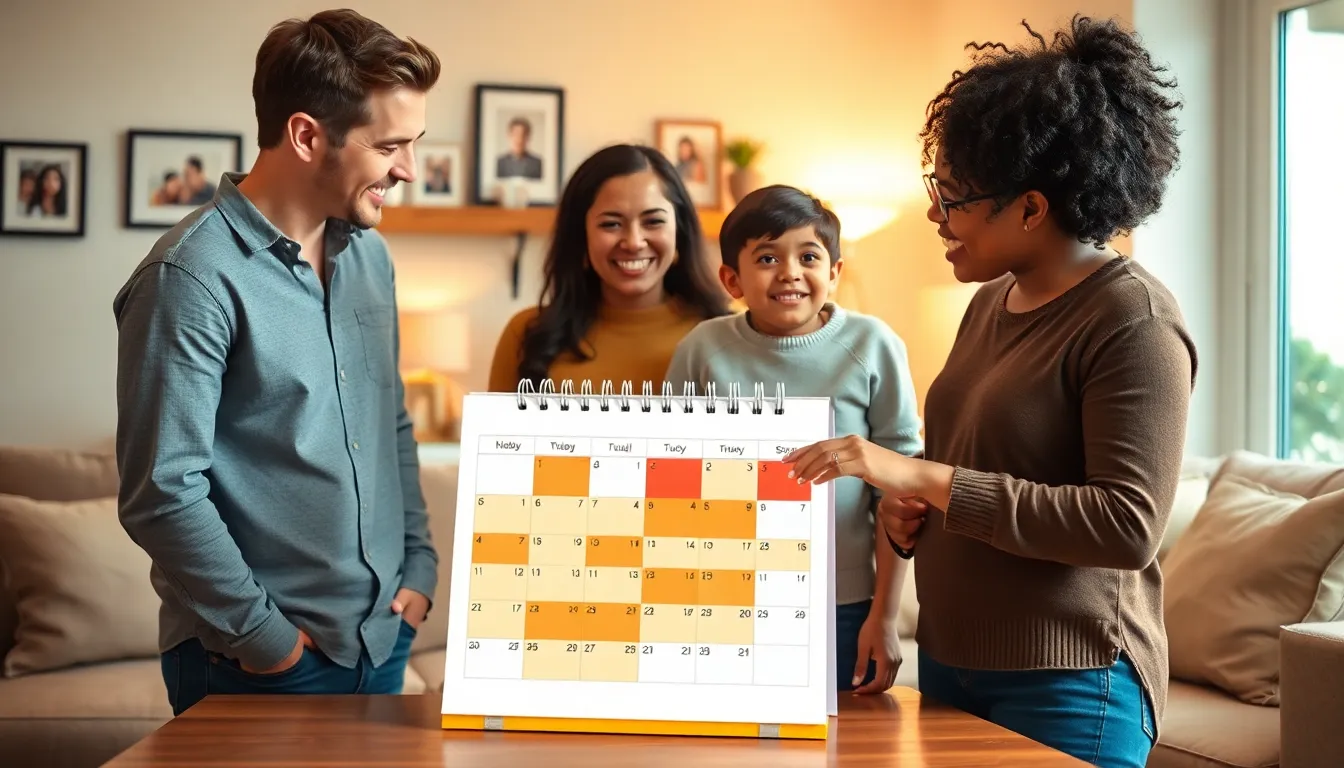Table of Contents
ToggleIn the wild world of parenting, the terms “solo” and “single” often get tossed around like confetti at a birthday party. But wait—are they the same thing? Not quite! Solo parenting is like being the star of a one-person show, while single parenting is more of a team sport, minus a few players.
Understanding Solo Vs Single Parenting
Solo parenting involves managing all parenting responsibilities alone, while single parenting refers to raising children without a partner but may include support systems. Understanding these distinctions clarifies the unique experiences of each parenting style.
Definitions
Solo parenting describes a situation where one person takes full responsibility for their child or children. This individual independently handles all aspects of their child’s life, including decision-making and daily tasks. Conversely, single parenting usually involves one parent raising a child without a spouse or partner but may still receive emotional or logistical support from family or friends. This relationship dynamic can vary significantly from solo parenting.
Key Differences
Differences between solo and single parenting highlight varied experiences. Solo parenting emphasizes self-reliance, as the parent navigates every challenge alone. Multiple responsibilities rest solely on one individual. In contrast, single parenting often allows for shared resources through family networks or co-parenting arrangements. Single parents may find comfort in the emotional support from their chosen circle, which may not be available to solo parents. Understanding these nuances helps clarify the complexities of each parenting approach.
Challenges Faced In Solo Parenting


Solo parenting brings unique challenges that impact daily life. Managing all responsibilities alone often leads to added pressure in multiple areas.
Emotional Strain
Emotional strain ranks high among solo parenting challenges. Dealing with feelings of isolation can negatively affect mental health. Stress often becomes overwhelming without a partner’s support or shared responsibilities. Solutions like support groups or therapy might help manage these feelings. Finding time for self-care becomes essential. Alone, solo parents frequently prioritize their child’s needs but neglect their own emotional well-being. Investing in self-help resources or community connections can mitigate emotional fatigue.
Financial Considerations
Financial considerations can significantly impact solo parenting. Sole responsibility for all expenses challenges many solo parents. Budgeting becomes crucial to cover necessities such as housing, food, and childcare. Resources may also be limited in situations where one income supports the entire household. Assistance programs or government aid often serve as lifelines. Saving for emergencies can offer additional security. Financial literacy plays a vital role in navigating these challenges effectively. Understanding benefits available can empower solo parents to make informed decisions.
Benefits Of Solo Parenting
Solo parenting offers unique advantages that enhance the overall experience of raising children alone. Parents develop skills that strengthen their resilience and adaptability in challenging situations.
Independence and Self-Reliance
Independence becomes a cornerstone for solo parents, who learn to manage their households autonomously. Self-reliance fosters decision-making abilities, enabling parents to create environments that suit their family’s needs. The responsibility of all aspects of parenting helps them cultivate confidence and resourcefulness. Each challenge faced builds a deeper understanding of personal strengths and capabilities. Ultimately, this independence can lead to a more fulfilling parenting journey.
Stronger Parent-Child Bond
Stronger bonds often form between solo parents and their children due to the exclusive time spent together. Shared experiences create lasting memories and deepen emotional connections. Parents must rely solely on their efforts to provide love, support, and guidance. Consequently, this dynamic nurtures communication and trust, essential elements in a healthy relationship. A focused approach to parenting can significantly enhance mutual respect and understanding, resulting in a solid foundation for future development.
Strategies For Effective Solo Parenting
Effective solo parenting involves strategic planning and a supportive network. With a few core strategies, one can manage challenges more efficiently.
Time Management Tips
Prioritizing tasks keeps a solo parent’s day organized. Creating a daily schedule enhances productivity and ensures essential responsibilities are balanced. Break tasks into smaller steps for easier completion. Utilizing tools like calendars and to-do lists aids in tracking progress. Setting specific time slots for activities reduces decision fatigue. Allocating time for self-care is crucial to maintain energy levels. Nurturing a routine helps children understand expectations and fosters stability at home. Achieving a relaxed atmosphere benefits both parent and child.
Seeking Support Networks
Building a support network strengthens a solo parent’s resilience. Connecting with other solo parents provides shared experiences and insights. Joining community groups offers opportunities to engage socially while receiving encouragement. Utilizing online forums expands access to resources and tips from a broader audience. Establishing relationships with family members can also provide emotional and logistical support. Learning about local resources like childcare services can alleviate some day-to-day burdens. Encouragement from friends can uplift spirits, making challenging days more manageable. Support fosters well-being, promoting a balanced and fulfilling parenting experience.







